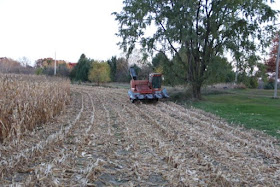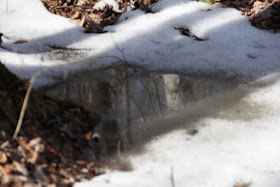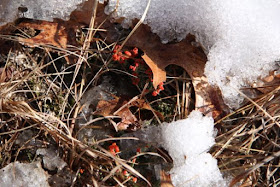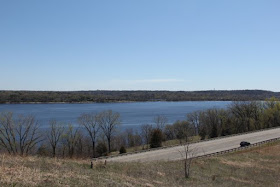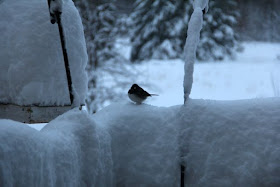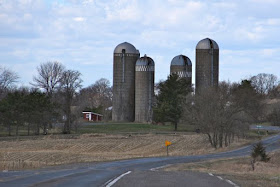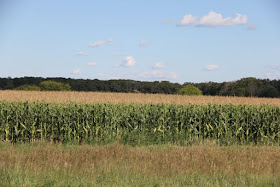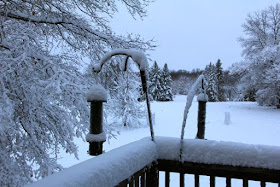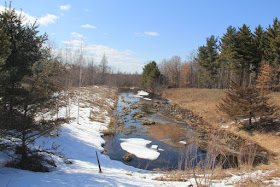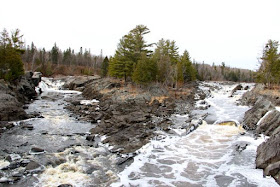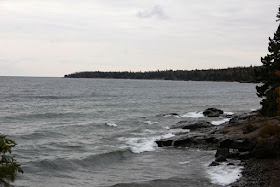corn harvest: is this farm organic? probably not
Photo by J. Harrington
Do you know how many farms there are in Minnesota that are certified organic? According to the Minnesota Department of Agriculture, there are an estimated 560 organic farms, of which only a little more than 200 (1 out of 3) are listed in the voluntary directory. According to this Census report, as of 2012, Minnesota had about 75,000 farms totaling nearly 26 million acres of the state’s 54 million acres. Since we're considering very round numbers here, I'm going to take the liberty of dividing 560 estimated organic farms, heck, let's round up to 1,000, by 75,000 total farms. That means something like 1% to 1.5% of Minnesota's farms are organic. Again from the census report "net cash farm income ... averaged $94,345 per farm."
It would be interesting to get a sense of the distribution of income in addition to the average, but it's clear that farming wasn't completely going broke and that, like many small business owners, farmers no doubt try to maximize profit by minimizing expenses. Getting certified organic costs money, but, on the other hand, I keep reading that more and more consumers are looking for locally, sustainably produced food, for which organic is often a shorthand term. Could Minnesotans make a dent in cleaning up their water by eating less and less processed foods, living a more healthy lifestyle and reducing the commodity market for row crop producers? Part of the challenge of clean water in Minnesota would then seem to be the need to educate consumers about the benefits to our water from organic farming. It's not a panacea, as we noted here a few days ago, but it seems to offer several major steps in the right direction and can help address greenhouse gas reductions too.
For a slightly different perspective on some of these topics, take a look at MinnPost's Earth Journal coverage with Dr. Deb Swackhamer. You might also want to take a look at the Minnesota state auditor's maps on the age of city infrastructure throughout the state. We'll no doubt need quite a few "extra" days to get the job done. UPDATE: USDA offers "new" conservation tool for organic farmers.
FEBRUARY 29
Jane Hirshfield
An extra day —
Like the painting’s fifth cow,
who looks out directly,
straight toward you,
from inside her black and white spots.
An extra day —
Accidental, surely:
the made calendar stumbling over the real
as a drunk trips over a threshold
too low to see.
An extra day —
With a second cup of black coffee.
A friendly but businesslike phone call.
A mailed-back package.
Some extra work, but not too much —
just one day’s worth, exactly.
An extra day —
Not unlike the space
between a door and its frame
when one room is lit and another is not,
and one changes into the other
as a woman exchanges a scarf.
An extra day —
Extraordinarily like any other.
And still
there is some generosity to it,
like a letter re-readable after its writer has died.
********************************************
Thanks for visiting. Come again when you can.
Please be kind to each other while you can.
Monday, February 29, 2016
Too little, but not yet too late
Sunday, February 28, 2016
Remembering dancing
volatile storm clouds
Photo by J. Harrington
Yesterday was 59F, today, at midday, we were driving through a brief snow squall. That fits my definition of volatility. If you look at the distribution of humans on the earth, it's clear that we are a highly adaptable species. It's not clear that we can successfully adapt to weather that's extremely variable over short periods of time. Remember those Minnesota Springs when "late frosts" largely wiped out local apple crops some years? Have you read about "just in time deliveries" and thought about how that's supposed to work in a world affected by Superstorm Sandys? These, and related topics, remind me again of Donella Meadows beginning to her wonderful paper Dancing with Systems. She starts out:
"People who are raised in the industrial world and who get enthused about systems thinking are likely to make a terrible mistake. They are likely to assume that here, in systems analysis, in interconnection and complication, in the power of the computer, here at last, is the key to prediction and control. This mistake is likely because the mindset of the industrial world assumes that there is a key to prediction and control.If you read nothing else in this posting, please (re)read the last sentence in preceding the quotation. Then think about how we are approaching climate change, or the upcoming election in the US, or the global economy. We know how to do better. It's harder than the way we usually behave, but it may become an essential adaptation for surviving climate change's effects. At least the local weather looks to be somewhat seasonably stable this week upcoming.
"I assumed that at first too. We all assumed it, as eager systems students at the great institution called MIT. More or less innocently, enchanted by what we could see through our new lens, we did what many discoverers do. We exaggerated our own ability to change the world. We did so not with any intent to deceive others, but in the expression of our own expectations and hopes. Systems thinking for us was more than subtle, complicated mindplay. It was going to Make Systems Work.
"But self-organizing, nonlinear, feedback systems are inherently unpredictable. They are not controllable. They are understandable only in the most general way. The goal of foreseeing the future exactly and preparing for it perfectly is unrealizable. The idea of making a complex system do just what you want it to do can be achieved only temporarily, at best. We can never fully understand our world, not in the way our reductionistic science has led us to expect. Our science itself, from quantum theory to the mathematics of chaos, leads us into irreducible uncertainty. For any objective other than the most trivial, we can’t optimize; we don’t even know what to optimize. We can’t keep track of everything. We can’t find a proper, sustainable relationship to nature, each other, or the institutions we create, if we try to do it from the role of omniscient conqueror."
By James Whitcomb RileyWet-weather Talk
It hain't no use to grumble and complane;It's jest as cheap and easy to rejoice.—When God sorts out the weather and sends rain,W'y rain's my choice.
Men ginerly, to all intents—Although they're apt to grumble some—Puts most theyr trust in Providence,And takes things as they come—That is, the commonalityOf men that's lived as long as meHas watched the world enugh to learnThey're not the boss of this concern.
With some, of course, it's different—I've saw young men that knowed it all,And didn't like the way things wentOn this terrestchul ball;—But all the same, the rain, some way,Rained jest as hard on picnic day;Er, when they railly wanted it,It mayby wouldn't rain a bit!
In this existunce, dry and wetWill overtake the best of men—Some little skift o' clouds'll shetThe sun off now and then.—And mayby, whilse you're wundern whoYou've fool-like lent your umbrell' to,And want it—out'll pop the sun,And you'll be glad you hain't got none!
It aggervates the farmers, too—They's too much wet, er too much sun,Er work, er waitin' round to doBefore the plowin' 's done:And mayby, like as not, the wheat,Jest as it's lookin' hard to beat,Will ketch the storm—and jest aboutThe time the corn's a-jintin' out.
These-here cy-clones a-foolin' round—And back'ard crops!—and wind and rain!—And yit the corn that's wallerd downMay elbow up again!—They hain't no sense, as I can see,Fer mortuls, sech as us, to beA-faultin' Natchur's wise intents,And lockin' horns with Providence!
It hain't no use to grumble and complane;It's jest as cheap and easy to rejoice.—When God sorts out the weather and sends rain,W'y, rain's my choice.
********************************************
Thanks for visiting. Come again when you can.
Please be kind to each other while you can.
Saturday, February 27, 2016
Spring? Soon!
Just back from a walk through our local wetland. No sign of skunk cabbage yet. Ground is mostly frozen hard, no give underfoot, unforgiving on the knees and ankles.
trees reflected in pooled snow melt
Photo by J. Harrington
moss? identification?
Photo by J. Harrington
moss? Identification?
Photo by J. Harrington
Today's melting is filling the vernal pools. Some of the mosses(? not my strong point) are starting to brighten. As I recall from last year or the one before, Spring wildflowers arrived here some two or three weeks later than their arrival at William O'Brien State Park about 25 miles south. It's not quite time yet.
To the Thawing Wind
Robert Frost, 1874 - 1963
Come with rain, O loud Southwester!
Bring the singer, bring the nester;
Give the buried flower a dream;
Make the settled snowbank steam;
Find the brown beneath the white;
But whate’er you do tonight,
Bathe my window, make it flow,
Melt it as the ice will go;
Melt the glass and leave the sticks
Like a hermit’s crucifix;
Burst into my narrow stall;
Swing the picture on the wall;
Run the rattling pages o’er;
Scatter poems on the floor;
Turn the poet out of door.
********************************************
Thanks for visiting. Come again when you can.
Please be kind to each other while you can.
Friday, February 26, 2016
Go with the flow at the Water Summit?
The day before yesterday, I mentioned our icy driveway. Today, those concerns were put to shame. About a mile or so South of our drive, three of the neighborhood children were literally ice skating in (on?) what I assume is their own drive. I suppose that shows what losing some creativity as we age can do to us, although I do remember, when I was junior high age, or thereabouts, skiing down the driveway of an old, Victorian house we lived in in Hingham, Massachusetts. It was lots of fun until I almost got run over by the car driving by on the road our driveway intersected. My thinking was short-sighted.
Mississippi River in Minneapolis
Photo by J. Harrington
Given tomorrow's forecast, local snow and ice cover will soon be minimized if not eliminated for the time being. My sympathy goes out to those who'll be stuck inside at the Governor's "Water Summit." I'm planning on enjoying some time outside tomorrow. I'll read about what happened at the Summit in the news on Sunday. From the list of topics, I'm disappointed that there doesn't seem to be a more systemic approach to the thinking behind the Summit. For example, much (all?) of Minnesota's agriculture is heavily subsidized. What, if any, are the existing requirements linking qualifications for agricultural subsidy with clean water standards, or are we, as a society, actually subsidizing farmers to pollute our surface and groundwater.
I agree with the Governor's idea that we should focus on solutions rather than blame, unless the blame lies with out institutional systems as well as our physical ones. I did a little research earlier today and was surprised to discover that "organic farming" isn't necessarily a panacea for clean water. You'll get a chance to read more about that here when I've done a better job of cross- and double-checking (no, not the hockey kind). Here's the basics of my current thinking though:
- If a voluntary approach for water quality is good enough for agriculture, it should also be good enough for industry and urban wastewater. (I'm not saying this idea isn't all wet, just that it's time for more equity in our approach if we really want to solve the problem.)
- We shouldn't let politics distort priorities in the expenditure of Legacy funds and or the selection of projects. We've already committed half a billion dollars to clean water. Are we following the right strategy?
- We need to be mindful that many of the communities that now need additional state funding to upgrade their water and wastewater facilities probably needed federal and state funding to construct them in the first place. Chuck Marohn or someone else from Strong Towns could probably share some worthwhile thoughts on this issue.
- We need lots more thinking about what else needs to change to get the water quality we want and need. I still have a few scars from the days I worked for the Metropolitan Council and was "educated" by Minnesotans in the southeast corner of the state that "we can't all live upstream." The metro area finished separating its historic combined sewer systems, eliminating those raw sewage discharges to the Mississippi River.
- Lowering water quality standards or playing other political games does a disservice to those Minnesotans who depend on government to protect their commons. I'm still trying to understand how the drivers of the decision-making process that led to changing Flint's water supply source differ from the drivers to the approach Minnesota is using to "protect" its manoomin from polluted water. Is minimizing protection to save dollars and / or jobs in the short term the kind of answer we want?
By Ned BalboThe Sugar Thief
If it was free, you taught, I ought to grab it
as you did: McDonald’s napkins, pens,
and from the school where you were once employed
as one of two night shift custodians,
the metal imitation wood wastebasket
still under my desk. But it was sugar
that you took most often as, annoyed
on leaving Dunkin’ Donuts, pancake house,
and countless diners, I felt implicated
in your pleasure, crime, and poverty.
I have them still, your Ziploc bags of plunder,
yet I find today, among the loose
change in my pockets, packets crushed or faded—
more proof of your lasting legacy.
********************************************
Thanks for visiting. Come again when you can.
Please be kind to each other while you can.
Thursday, February 25, 2016
Known knowns as stones
Several times in the past My Minnesota has made reference to either:
It ain't what you don't know that gets you into trouble. It's what you know for sure that just ain't so.or to
Mark Twain
It isn't what we don't know that gives us trouble, it's what we know that ain't so.Just the other day, I ran into yet another example of the veracity of these sentiments, but, fortunately, did so without giving myself too much trouble.
Will Rogers
lower St. Croix river
Photo by J. Harrington
Right up until I read a recent article about looking for agates along the St. Croix river, I "knew" that, in Minnesota, you looked for agates along some of Lake Superior's North Shore Beaches. That just ain't so. I probably misled myself by leaping to conclusions (me?) since I'd seen (and have a copy of) Rock Picker's Guide to Lake Superior's North Shore but hadn't come across a similar reference for anywhere else in the state (nor had I looked for one).
I bring all of this up today because next week Minnesota holds its political caucuses, as part of this country's presidential election process. I've noticed more and more that, instead of simply differentiating between politicians and political parties, the electioneering sounds increasingly as if each candidate and party believes they are the only answer to our future, rather than an option for our future. I'm as guilty of falling into this kind of thinking as everyone else, I suppose. That's why I'm reminding myself that, just as there may be more than one agate on a beach, there's more than one beach that holds agates and I'll probably never find a perfect agate on a perfect beach. For next Tuesday, and next November 8th, we need to remember that we're all in this together and that "we all do better when we all do better." Let's stop throwing rocks at each other. [Also remember Yoda: "Do or do not. There is not try."] All of the preceding is part of my efforts to (re)train myself to think in terms of both / and rather than either /or. The world we've made for and with ourselves seems more and more to require it.
By Henry David ThoreauMen Say They Know Many Things
Men say they know many things;But lo! they have taken wings, —The arts and sciences,And a thousand appliances;The wind that blowsIs all that any body knows.
********************************************
Thanks for visiting. Come again when you can.
Please be kind to each other while you can.
Wednesday, February 24, 2016
Will climate change increase Minnesota's Spring volatility?
We are less than a week from the beginning of meteorological Spring. Goldfinches are starting to brighten up. There's been a report of swans in the neighborhood, but it's unclear if they're migrants or strays from one of the flocks that overwinters on the lower St. Croix. Snow cover is shrinking from the northern edges of the fields. Gravel roads are turning to mud. Unfortunately, the compacted snow that's covered the driveway all Winter now makes it ice-covered since it gets no exposure to the sun during our freeze-thaw season. Maybe if we get to 50 or so on Saturday it'll be safe to walk as well as drive on.
2014 pre-Easter junco visit
Photo by J. Harrington
A flock of dark-eyed juncos moved through the woods in front of the house yesterday. I assume they're headed north. Sandhill cranes recently have been reported in southern Wisconsin and Illinois. I expect some around here by mid-March unless Winter returns with a vengeance and stays awhile. Meanwhile, despite the growing levels of activity, the weather continues its dreary, gray plodding around here. Better that than the extreme weather excitement the southeastern states have experienced this week.
I think I've previously made it clear that I'm a fan of Edward Abbey's writing. I believe I would probably have like the man if I'd ever met him. At the moment, I'm reading Resist much, obey little, remembering Ed Abbey, a commemorative series of essays by those who knew him, including many of my other hero writers such as Wendell Berry, Gary Snyder, Sam Hamill, and Terry Tempest Williams. Abbey helps me feel less guilty about some of my less redeeming characteristics and reinforces my wonder at the public's lack of outrage at what we're doing to this country's natural resources and beauty in the name of jobs and convenience. If you've ever read, or even wanted to read, The Monkey Wrench Gang or Desert Solitaire, you'll likely enjoy Resist Much, Obey Little. I happened into my copy while browsing a local, independent book store, confirming my belief that serendipity beats algorithms, whether or not they have long tails. Soon it will be time to focus more on outside activities, but, with my nose buried in a book, the gray skies are less obvious, especially if my imagination is in a desert with Ed.
By Matthea HarveyShiver & You Have Weather
In the aftermath of calculusyour toast fell butter-side down.
Squirrels swarmed the lawnsin flight patterns. The hovercraft
helped the waves along. Fromevery corner there was perspective.
On the billboards the diamondswere real, in the stores, only zirconia.
I cc’ed you. I let you know.Sat down to write the Black Ice Memo.
Dinner would be meager &reminiscent of next week’s lunch.
So what if I sat on the sectional?As always I was beside myself.
********************************************
Thanks for visiting. Come again when you can.
Please be kind to each other while you can.
Tuesday, February 23, 2016
We can't protect the environment one silo at a time!
Many, many years ago, before I ended up in Minnesota, I was the director of the Boston region's "Areawide Water Quality Management Plan." It focused on the relationship between land use and water quality for nine river basins. Because I was smart enough and lucky enough to hire a young engineer who didn't think like most engineers I had met, we developed our work program on the basis of multi-purpose, multi-objective programming, getting folks out of their traditional silos.
silos are for storage, not problem-solving
Photo by J. Harrington
Thaws the period of the first Earth Day, when Limits to Growth had just been published and the Congress passed the Federal Water Pollution Control Act Amendments of 1972, so that:
"Under authority contained in the 1972 legislation, the EPA had primary responsibility for implementing the ambitious and optimistic goals of ensuring that all waters of the United States be "fishable" and "swimmable" by 1983, 10 years after the act's passage.Two generations or so later, we haven't come close to attaining that Act's goals, (nor those go the 1949 Housing Act for that matter) but we have learned some things along the way. We've also encountered a whole other, often related, set of issues associated with climate change, driven by global warming. Some of the solutions to the more recently discovered problems can also help us get cleaner water if we go about it right. Here's one example from the Spring 2016 issue of Yes! magazine:
The 1972 Clean Water Act also set as a lofty goal the "zero discharge" of pollutants into the nation's waters by 1985. Congress passed related legislation also at this time to ensure that its intent to cover all waters of the United States was clear."
"The food system is a big energy consumer, with fossil fuels used in the manufacture of fertilizers, food processing, and transportation. We could reduce a lot of that fuel consumption by increasing the market share of organic local foods. While we’re at it, we could begin sequestering enormous amounts of atmospheric carbon in topsoil by promoting farming practices that build soil rather than deplete it—as is being done, for example, in the Marin Carbon Project."That same issue has a story about perennial grains, another way to improve agricultural water quality and feed our population of provide stock for bioenergy. We're going to need to do more systems thinking across multiple systems to make all this work well. Single purpose, single solution thinking won't get us where we need to go. At the same time we're sequestering carbon, we're reducing our use of fertilizers, improving our local food system and farm economy and greater Minnesota communities. More producers equals more local shoppers. If we allow each sector to think selfishly only about itself and it's good, we'll fail. If you don't want to take my work for it, go read some of Peter Senge's writing on systems and learning organizations. Minnesota can become a learning government if enough of us help and (re)learn to talk to each other instead of shouting at each other. We've built some systems that cause smart people to do dumb things. We need to change those systems.
Enriching the Earth
To enrich the earth I have sowed clover and grass
to grow and die. I have plowed in the seeds
of winter grains and of various legumes,
their growth to be plowed in to enrich the earth.
I have stirred into the ground the offal
and the decay of the growth of past seasons
and so mended the earth and made its yield increase.
All this serves the dark. I am slowly falling
into the fund of things. And yet to serve the earth,
not knowing what I serve, gives a wideness
and a delight to the air, and my days
do not wholly pass. It is the mind's service,
for when the will fails so do the hands
and one lives at the expense of life.
After death, willing or not, the body serves,
entering the earth. And so what was heaviest
and most mute is at last raised up into song.
********************************************
Thanks for visiting. Come again when you can.
Please be kind to each other while you can.
Monday, February 22, 2016
Might a private ditch need an industrial point source discharge permit?
Late last month, Governor Dayton backed "off water-buffer strip plan for private ditches." He "said he pulled back on the private ditch efforts and ordered the Minnesota Department of Natural Resources to stop mapping them after Republicans threatened to torpedo water quality projects Dayton's seeking in a public works spending bill in the coming session." I can understand the Governor's concerns, although I'm appalled at the quality of Minnesota's waters and the snail's pace rate at which we can expect them to attain federally mandated standards. I also believe the world is full of carrots and sticks.
I'm delighted that the Governor is convening a water summit later this week. If Minnesota continues to be faced with farmers and farm organizations who want to continue a basically free ride while the rest of us pay for wastewater and stormwater treatment, maybe we need to take another look at the language from the federal Clean Water Act, which defines Point Source as:
[A]ny discernable, confined and discrete conveyance, including but not limited to any pipe, ditch, channel, tunnel, conduit, well, discrete fissure, container, rolling stock, concentrated animal feeding operation, or vessel or other floating craft, from which pollutants are or may be discharged. This term does not include agricultural stormwater discharges and return flows from irrigated agriculture (emphasis added).27
is field corn really a "food crop?"
Photo by J. Harrington
Perhaps some creative, clever, clean water or environmental advocacy non-profit organization could point out to a judge or legislator that a private ditch owner, not subject to buffer strips, should be treated as a point source discharge, just like any other industrial operation. If the owner(s) of the private ditch object, the burden should fall to the ditch owner(s) to prove, year after year, that the only flows to and through the ditch are agricultural stormwater and return flows from irrigated agriculture. Perhaps those who issue groundwater permits could be faced with a requirement to not issue permits that result in return flows to uncontrolled private ditches.
We're not going to achieve climate change goals by pursuing business as usual. The same concern applies to attaining water quality standards. Cities and industries are no long the major problems affecting water quality. Our heavily subsidized industrial agriculture system is. I don't believe it would be that difficult to craft appropriate exemptions of organic farms or those planted in perennial grasses. Is it time to treat industrial agriculture dischargers as the industries they are? See if you can guess what I think.
Toward the end of May last year, we shared a Wendell Berry poem I think best fits today's posting. Here's the link to that post.
********************************************
Thanks for visiting. Come again when you can.
Please be kind to each other while you can.
Sunday, February 21, 2016
Happy #MotherLanguageDay (Impressions on "Impressions" 2)
Today is Mother Language Day. Robert Frost has noted that poetry is what's left behind by translation. Ursula K. Le Guin and other writers offer more reasons for learning languages. Perhaps the challenge of bi- or multilingualism is why some say "a picture is worth a thousand words." If so, here's today's six thousand+ word posting.
tree of life - 3d -- cathy gilles
Photo by J. Harrington
artistic jewelry -- carolann rosenthal
Photo by J. Harrington
stoneware -- richard vincent
Photo by J. Harrington
coiled reed basket -- laurie greeninger
Photo by J. Harrington
Hallberg Center 1
Photo by J. Harrington
Hallberg Center 2
Photo by J. HarringtonBy Alexandra TeagueLanguage Lessons
The carpet in the kindergarten roomwas alphabet blocks; all of us fidgetingon bright, primary letters. On the shelfsat that week's inflatable sound. The thwas shaped like a tooth. We sangabout brushing up and down, practicedexhaling while touching our tonguesto our teeth. Next week, a puffy Ulike an upside-down umbrella; the restof the alphabet deflated. Some days,we saw parents through the windowsto the hallway sky. Look, a fat lady,a boy beside me giggled. Until thenI'd only known my mother as beautiful.
********************************************
Thanks for visiting. Come again when you can.
Please be kind to each other while you can.
Saturday, February 20, 2016
Impressions of "Impressions"
I'm consistently impressed by the number of creative and talented artists that live in my general vicinity. Today and tomorrow I'm going to keep words to a minimum here and share some photos from the Wyoming Area Creative Arts Community's current exhibit, Impressions in Nature's Elements. First, though, I want to share a new word I learned: pyrography. It means wood burning, with a heated metallic point. Normal rants and raves will undoubtedly return next week.
duck in flight -- dave freemore
Photo by J. Harrington
the garden concierge -- b.t. johnson
Photo by J. Harrington
grandma's flowers -- judy franke
Photo by J. Harrington
jar flowers -- tree croyle
Photo by J. Harrington
glass works series -- jonas johnson
Photo by J. Harrington
all God's children -- judy franke
Photo by J. Harrington
Oscar Wilde : Impressions
Oscar Wilde (1855-1900) 1881FOOTNOTES 1 the title can be translated as impressions or sketches; 2 brown plumaged wading bird with large, curved beak and distinctive forlorn cry; 3 the flight of the moon; 4 inland bird with sharp repetitive call
********************************************
Thanks for visiting. Come again when you can.
Please be kind to each other while you can.
Friday, February 19, 2016
Don't dilute water quality
Please send the last handful of climate change deniers to Minnesota right now, where they can observe rain in the middle of February! In Minnesota! REALLY? Liquid water? Minnesota? February?
Sunrise River, tributary to the St. Croix
Photo by J. Harrington
Dick Osgood, with whom I worked years ago when we were both on the staff of the Twin Cities Metro Council, has a "Local View" that was published in the Duluth News Tribune back at the end of January and that I just came across today. I generally agree with much of his reasoning, but not all of it. We pretty much align on the magnitude and source of the problems of Minnesota's, and the country's, water quality problems. I would suggest, however, that we need a more rigorous, much more rigorous, approach to making improvements. How many of you were taught by your parents about the necessity of learning to clean up after yourselves?
Agriculture has been a free rider for too long. We keep treating environmental protection as an optional "externality" that may be too expensive for agriculture, or mining, or public water supplies like Flint's, to pay for. There's a better way if all water users pay what's needed to discharge water that supports the basic designated uses we all agree on, charge what's needed for their products (water quality becomes a cost of production), and subsidize those who need but can't afford such food or potable water or cell phones or transportation, but we stop subsidizing polluters. It's a game we'll never win. We can distinguish between agriculture that is industrial, producing row crops instead of local food stocks. We're learning to do that already with our food systems becoming local, organic and fair trade. It's time we face up to the fact that there is no readily available Planet B and, like good children everywhere, we need to pick up after ourselves or no one will want to play with us.
In many ways, the issue of water too expensive to clean up is little different than banks that are "too big too fail," schools that are too expensive or don't educate, or, reaching way back in my memory banks, cars that are "unsafe at any speed." We must accept the fact that someone, and it should be us, needs to pay for our free lunches. Take some time, visit the Donella Meadows Institute's web site and read about sources and sinks and related matters. Then see if my reasoning makes sense. It's no different than discovering that, to minimize the catastrophic effects of climate change, we need to leave about 80% of the fossil fuels in the ground. We could even reason that Congress anticipated such constraints with the passage of the 1972 Clean Water Act amendments when they enacted this requirement:
For any body of water with designated uses that do not include “fishable/swimmable” target use that is identified in section 101(a)(2) of CWA, a Use Attainability Analysis must be conducted. Every three years, such bodies of water must be reexamined in order to verify if new information is available that demand a revision of the standard. If new information is available that specify “fishable/swimmable” uses can be attained, then the use must be designated.[11]There are existing standards and procedures to be followed if a state wishes to establish that a water quality designated use can't be attained. Minnesota already has a list of limited resource value waters. I don't think we should add to it, do you?
By B. H. FairchildEarly Occult Memory Systems of the Lower Midwest
In his fifth year the son, deep in the backseatof his father’s Ford and the mysteriumof time, holds time in memory with words,night, this night, on the way to a stalled rig southof Kiowa Creek where the plains wind stacksthe skeletons of weeds on barbed-wire fencesand rattles the battered DeKalb sign to makethe child think of time in its passing, of death.
Cattle stare at flat-bed haulers gunning clumpsof black smoke and lugging damaged drill pipeup the gullied, mud-hollowed road. Road, this
road. Roustabouts shouting from the crow’s nestfloat like Ascension angels on a ring of lights.Chokecherries gouge the purpled sky, cloud-swags running the moon under, and starlightrains across the Ford’s blue hood. Blue, this blue.
Later, where black flies haunt the mud tank,the boy walks along the pipe rack dragginga stick across the hollow ends to make a kindof music, and the creek throbs with frog songs,locusts, the rasp of tree limbs blown and scattered.The great horse people, his father, these sounds,these shapes saved from time’s dark creek as the carmoves across the moving earth: world, this world.
Thursday, February 18, 2016
Arting, reading, writing and baking
First, I want to invite you to stop by this evening and check out the Impressions in Nature's Elements exhibit. I'm one of the five collaborating poets, so, depending on when you arrive, you may, or may not, have a chance to hear me read a couple of my poems, including one that was a Popular Choice winner a couple of years ago at the North Woods Art & Book Festival in Hackensack, MN.
Second, I'd like to share with you a recently grown list of books I want to read this year (in addition to those I already have in my unread stack), based on reviews I've skimmed during the past few weeks. You may want to check out one or more of these for your own edification and entertainment.
a rapidly filling bookcase
Photo by J. Harrington
There are almost always other temptations for readers in the book reviews found in each issue of Orion, but those listed above top my list from the past several issues. YMMV. To them I have to add Annie Dillard's latest, The Abundance, to be published next month. To go with this list, I'm really looking forward to reading under a shining sun and a blue sky held up by warm Spring or early Summer air. I've had as many of the "it's cold and windy and a good day to stay inside and read" days as I can stand for now. On the other hand, as our economist friends would say, this Winter weather is prime for baking home-made bread, which is on tomorrow's agenda.I've already fed the sour dough starter today. Bread and books, food for the body and the soul.
- This World - Teddy Macker - poetry - Orion magazine, November | December 2015
- Rain: A Natural and Cultural History - Cynthia Barnett - nonfiction - Orion magazine, May | June 2015
- Think Like a Commoner - David Bollier - nonfiction - Orion magazine, March | April 2015
- A Country Called Childhood - Jay Griffiths - nonfiction - Orion magazine, March | April 2015
By Rachel WetzsteonRain at Reading
We had gathered under a tent in the parkfor some words before lunch and after separate mornings,and when—twice—the poet said “capital,”the lightning bolts that followed the nounhad me bolting too; I’d always suspectedGod’s communist leanings, but now I regrettedhow few exchanges we knowbetween craft and climate:
imagine a rhyme inciting a rainbow,blood feuds bruising the sky,hymns of forgiveness bringing a softnew light to the faces watching the last act,waltzes and songs and declamations—this would be capital entertainment!—locked in a clinch with open air.
But the lightning was as quick as it was loud.The clouds dispersed,and then so did the crowd.
********************************************
Thanks for visiting. Come again when you can.
Please be kind to each other while you can.
Wednesday, February 17, 2016
Pleasing some of the people some of the time?
The National Weather Service has a graphic on Twitter suggesting Winter lovers should cheer up because, despite the upcoming warming, many of our largest snowfalls occur in March and April. Based on my experience, that's true. It's also true that longer days and a sun that keeps climbing higher in the sky mean that the snow is likely to melt sooner than not. That's the good news for those of us who tolerate, rather than love Winter.
April 19, 2013 snowfall
Photo by J. Harrington
April 23, 2013 snow melt
Photo by J. Harrington
It seems as though Mother Nature and the National Weather Service have figured out how to please most of the people, most of the time. Now, can we get them to offer lessons in people pleasing to our politicians? Or have most of us become consistently too hard to please too much of the time?
By Tony HoaglandPlease Don't
tell the flowers—they thinkthe sun loves them.The grass is under the samesimple-minded impression
about the rain, the fog, the dew.And when the wind blows,it feels so goodthey lose control of themselves
and swobtoggle wildlyaround, bumping accidentally into theirslender neighbors.Forgetful little lotus-eaters,
solar-poweredhydroholics, drawing nourishment upthrough stems into theirthin green skin,
high on the expensivechemistry of mitochondrial explosion,believing that the dirtloves them, the night, the stars—
reaching down a little deeperwith their pale albino roots,all DizzyGillespie with the uttersufficiency of everything.
They don't imagine lawnmowers, the four stomachsof the cow, or human beings with bootswho stop to marvel
at their exsquisiteflexibility and color.They persist in their soft-headed
hallucination of happiness.But please don't mention it.Not yet. Tell mewhat would you possibly gain
from being right?
********************************************
Thanks for visiting. Come again when you can.
Please be kind to each other while you can.
Tuesday, February 16, 2016
Could Pipestone or Cloquet become Minnesota's Waukesha?
Dear Governor Dayton,
Please take a few minutes to read, if you haven't already, Andrew Revkin's New York Times opinion column on "Human Destiny." The points Revkin raises about climate change are, I believe, comparably valid regarding most of the the earth's limited, non-renewable resources as well as some of our theoretically renewable ones. That includes Minnesota's non-renewable mineral resources and the quality and potability of our nominally renewable water supplies.
St Louis River
Photo by J. Harrington
I have no doubt that you're aware of the Waukesha request to divert Great Lakes water for local use and to support local growth. I assume you're also familiar with the governance debacle that continues to poison the children of Flint, Michigan. These are but two examples of short-term, economics-driven, decisions that hinder our longer-term ability to thrive as a species. That's one of the major conclusions Revkin references in his column like this:
The alternative future is one where we decide to make the transition to a carbon-free economy before we’re forced into it by the depletion of fossil fuels. We’re going to run out anyway, and will need to learn to do without fossil fuels, so why not get weaned early, before we’ve trashed the climate? If we do that, we might not just buy ourselves a world, but a whole Universe.
Minnesota shore of Lake Superior
Photo by J. Harrington
It seems to me that similar reasoning, and constraints, should be applied to Minnesota's pending decision on the PolyMet NorthMet copper mine proposal and similar "development opportunities" affecting the exploitation of both northern Minnesota's minerals and southern and western Minnesota's agricultural soils. I'd like to suggest Minnesota still has some opportunities to "get weaned early," before we've irremediably polluted our waters to the point that Pipestone or Cloquet become the next Waukesha.
You're already showing legacy-creating leadership with the agricultural buffers and water infrastructure initiatives you've already proposed. Please continue and extend that leadership by denying permits for copper mining activities that involve unrealistically long remediation activities (500 years +/-water pollution abatement). Such frameworks could well end up making the issues facing Flint and Waukesha look simple and economical by comparison. The least expensive remediation almost always involves prevention. Please continue to emphasize the least expensive way to protect Minnesota's life-supporting resources. As Flint has no doubt learned, and Waukesha may be learning, "you don't know what you've got 'til it's gone." Minnesota still has some choices about what its got. Please protect those choices from "irrational exuberance" regarding treatment timeframes and financial assurances.
By Dolores HaydenExuberance
Exuberance sips bootleg gin from a garter flaskwith a ruby monogram “E.”
She wears a red dress one size too small,eyes wide, she flirts with everyone, dares
Lincoln Beachey to fly until he runs out of gas,rides a dead engine all the way down.
She watches Ormer Locklear climbout of the cockpit two hundred feet up,
tap dance on his upper wingas the houses of honest families
with their square-fenced yardsslide below his shuffle. An oval pond
winks in the sun, like a zero.Exuberance challenges pilots
to master the Falling Leaf, perfect the Tailspin,ignore the Graveyard Spiral, the Doom Loop.
These aviators predict every American will fly.Exuberance believes Everybody Ought
to Be Rich, John J. Raskob explains whyin the Ladies Home Journal. She gets stock tips
from her manicurist, call loans from her broker,buys Radio, Seaboard Utilities, Sears,
orders shares in investment trusts — why not? —chain stores keep multiplying, cars, trucks,
planes, houses. This nation is all about growth,growth and leverage, look at the skyscrapers shooting up,
men rivet steel, floor after floor, high-speed elevatorsspring through the cores, planes soar over them all.
Sherman Fairchild has made a millionselling aerial photographs of real estate.
Exuberance travels constantly, owns landin Miami, Miami Beach, Coral Gables, Palm Beach,
she trades “binders” on lots five times over,befriends Mr. Charles Ponzi from Boston
who is raking in a bundle near Jacksonville.Prices for sand and palms are sure to rise.
But how do we know when irrational exuberance
has unduly escalated asset values?
Wall Street has been wing walking,call it barnstormer capitalism,
soon the bankers and the brokers will stealthe aviators’ lexicon, claim their own tail risks,
graveyard spirals, doomsday cycles,wonder how everything blue-sky stayed up so long.
Exuberance buys more stock on margin,volume runs high, the ticker tape
can’t keep up, higher, higher, higher,Black Thursday, not a parachute in sight.
********************************************
Thanks for visiting. Come again when you can.
Please be kind to each other while you can.
